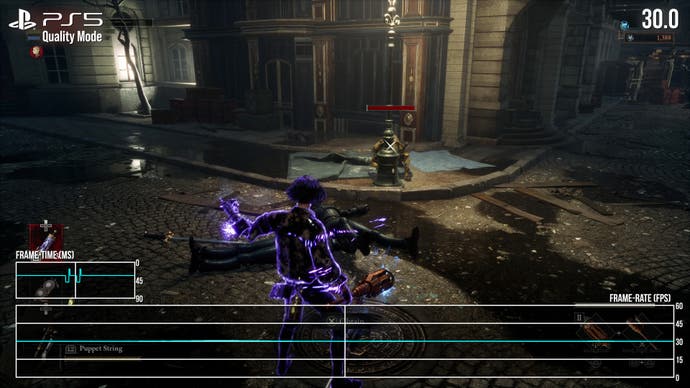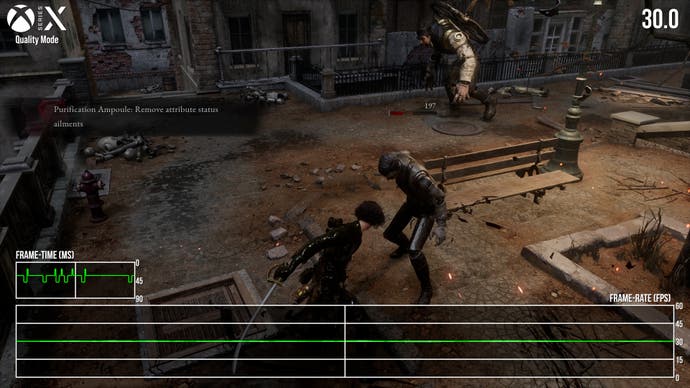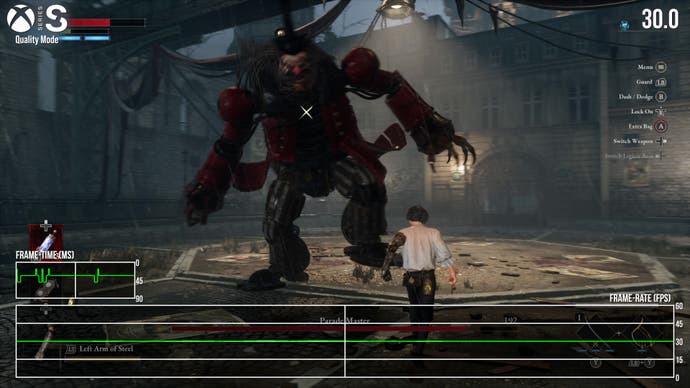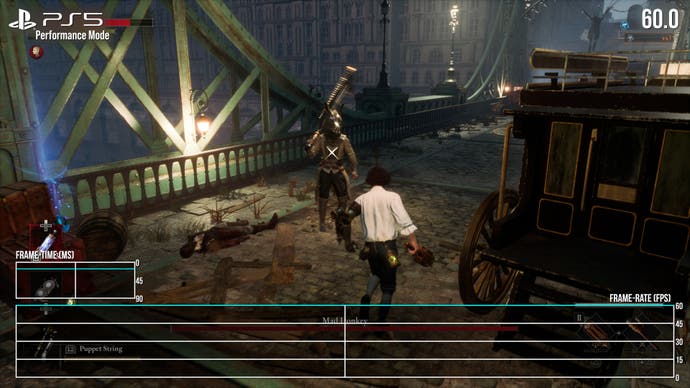
Lies of P has three performance modes - but only 60fps cuts the mustard
Lies of P may borrow from Dark Souls, but its console performance on PS5 and Series X/S surpasses the original - here's Tom Morgan for Digital Foundry.
Let's kick off with a look at the three machines in comparison. The first thing to point out is the resolution difference in the 30fps quality mode that targets higher visual settings. On PS5 and Series X, we're getting a practically fixed 4K with quality mode in place, with no deviations below 3840x2160 detected in numerous pixel tests.
Series S stacks up well by comparison too, with a native 1440p image that gets temporal anti-aliasing to clear up any noise in its upscale to 4K. The image quality on Series S is superb, despite the 4TF profile of the machine itself. Moreover, the three consoles are a match in core visual settings, with the same texture quality and geometric detail across Lies of P's cobble-stoned streets.
However, there are some more subtle tweaks to the Series S presentation, with lower-grade ambient occlusion shading and slightly reduced volumetric fog in certain scenes. For example, rising dust near the stairwell in the early Hotel Krat lobby area is pared back on Series S, as is volumetric fog next to a fountain. In some cases it's a more dramatic change, in others it's more subtle. Reductions in shading are also evident in some scenes viewed side-by-side, with Series X and PS5 offering a richer spread of indirect shadow bounces that add extra depth in between objects and characters like Pinocchio himself. Despite these differences though, Series S still looks superb on its own terms.
If we jump to performance testing on this 30fps quality mode, there isn't anything to split the three machines in how they play. PS5, Series X and S all run with a fixed 30fps cap through the game's opening chapters, from the station to the factory - even when teaming up with assist characters in effects-heavy boss fights.
The one drawback is obvious, though: uneven frame-pacing. Despite being perfectly fixed at the 30fps line, the ordering of frames is often erratic on the frame-time graph. This contributes to a choppier feel at 30fps, and even makes camera motion and animation look less smooth than they should. This applies to every console version too: PS5, Series X and Series S.
Sadly, it's a design flaw that echoes what we so often see in Souls games of old - especially last-gen efforts like Bloodborne on PS4. This does detract from Lies of P's fluidity in motion, at least in this 30fps quality mode, and is an unfortunate blemish on what is otherwise quite a technically-competent performance.


 The quality modes look great on each machine, but the frame-time inconsistencies hamper the fluidity of these 30fps and 40fps modes. | Image credit: Digital Foundry
The quality modes look great on each machine, but the frame-time inconsistencies hamper the fluidity of these 30fps and 40fps modes. | Image credit: Digital Foundry
Lies of P review - a decent imitation that never quite matches the real thing
Read more on Eurogamer.net
Thankfully, Lies of P has two additional performance modes to choose from. On PS5, Series X and S, there's a high frame-rate toggle which only works with quality mode selected. In short, this keeps the quality mode visual settings in place, but the frame-rate target rises to 40fps instead. This requires a 120Hz display to work, as a 40fps output doesn't go neatly into a 60Hz container - but does work nicely in a 120Hz container. The increase in frames rendered improves the flow of motion over 30fps, while reducing button-to-pixel response times.
The only catch is that, even at 40fps, all three machines still suffer from uneven frame-pacing. However, you're still better off using the 40fps mode if you have the option, though the higher frame-rate is paid for with lower internal resolutions that give the game a softer resolve. As GPU load increases, resolutions drop. On PS5 and Series X, for example, the game runs with an internal resolution of 1872p up to the full 4K. (It's possible that the game drops lower than this, but we didn't spot any lower figures on our pixel counts.) Meanwhile, Series S has a range of pixel counts, from 1200p up to the target maximum of 1440p.
The final option to check out is the 60fps performance mode - which is actually the default setting on PS5, Series X and Series S. That makes sense from a playability perspective, as it solves the frame-pacing issues of the quality modes - you get 60 unique frames per second, each at a steady 16.6ms cadence. The increase in fludity and decrease to input lag makes this the obvious setting to recommend; Lies of P as it was meant to be played.


 It's great to see a flat frame-time graph at 60fps, even in more demanding scenes. | Image credit: Digital Foundry
It's great to see a flat frame-time graph at 60fps, even in more demanding scenes. | Image credit: Digital FoundryDespite the gameplay improvements in performance mode, there are still a few oddities to be aware. Physics-based elements like flags still animate at 30fps, which looks slightly jarring, while certain enemy animations appear out of sync while at range. This looks strange, but perhaps this makes sense for a clockwork world?
Performance mode also predictably sacrifices resolution, which drops noticeably on every platform. PlayStation 5 and Xbox Series X run at an internal resolution that ranges from 1512p to 1800p. Both machines still hold up reasonably well in the final resolved image, thanks to TAA, but the game does look softer. Series S, meanwhile, runs between 972p up to a new maximum target of 1080p. Still, this feels like a reasonable cutback to hit a clean 60fps.
There are further sacrifices in visual settings on the two premium consoles, with PS5 and Series X both losing the higher-quality shading and volumetric fog that distinguished them from the Series S presentation in their respective quality modes. SSR seems to be affected too. The mist in the opening areas and the deep pockets of shade are relaxed for a lighter, less atmospheric result. And while we've not been able to find any mention of ray tracing features in Lies of P, it does appear that there's a simulated global illumination - a colour bounce from those blue respawn points that changes the hue of certain environments and only engages in quality mode.
Last edited:


